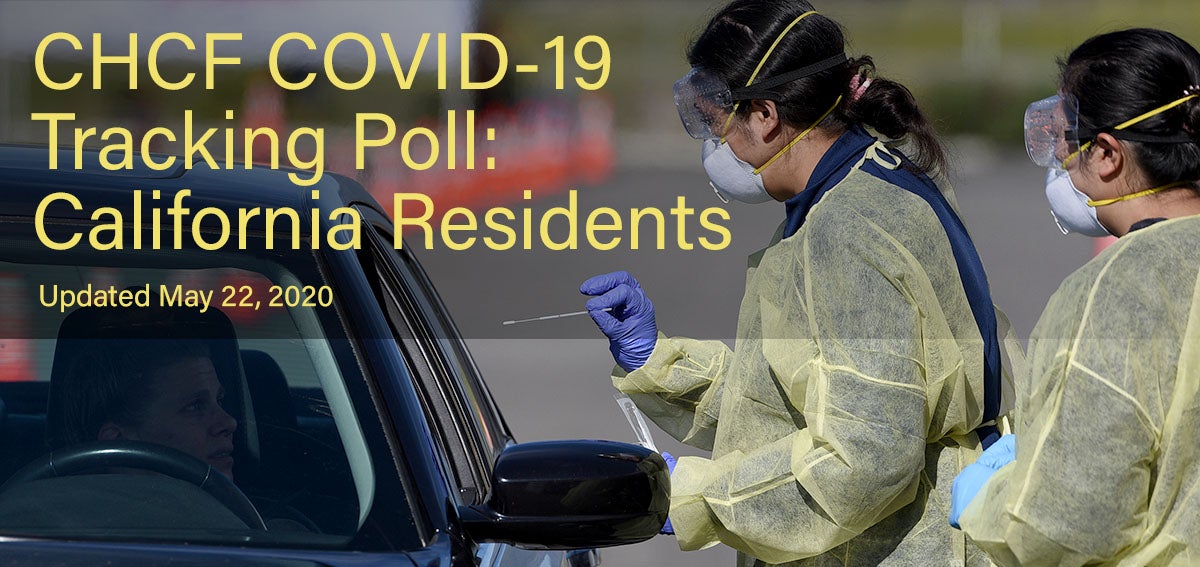
Previous Poll Results
Get all the results from CHCF’s surveys of California’s health care providers and the general public in this collection.
To help Californians and state policymakers understand evolving demands on the state’s health care system during the COVID-19 pandemic, CHCF is working with survey firms on two fronts. CHCF and global survey firm Ipsos are assessing residents’ desire for COVID-19 testing and their access to health care services. CHCF and Truth on Call, a physician market-research firm, are surveying different types of health care providers about availability of testing, personal protective equipment, and their experience in California’s health care delivery system. Download the charts and data for your own presentations and analyses.
May 22, 2020 — More than two months after state and local public health departments activated California’s historic response to the COVID-19 crisis, confidence in their decisionmaking remains strong, according to the latest tracking poll from CHCF and survey firm Ipsos.
With most counties now beginning to ease restrictions on many businesses and outdoor activities, a sizable majority of Californians continue to favor shelter-in-place orders. That support has declined over the last four weeks, with the most significant drop among people who live in rural areas. Responses to this survey were gathered last weekend, just days after Newsom allowed more businesses to reopen in some rural counties.
For the first time, the weekly tracking poll asked Californians how much trust and confidence they have in certain individuals and groups “when it comes to the new coronavirus and COVID-19 in California.” Nearly 7 in 10 Californians have confidence in the California Department of Public Health and in their county public health department. More than six in 10 trust Governor Gavin Newsom when it comes to COVID-19, while just under half have confidence in their local elected officials, and a third have confidence in religious or community leaders. More than 8 in 10 residents say they have “a great deal” or “a fair amount” of confidence and trust in their primary care doctors.
As most of the state’s 58 counties begin lifting various restrictions, Californians were asked which of the following statements comes “closest to [their] opinion” of the state’s shelter-in-place containment strategy:
- Californians should continue to shelter in place for as long as is needed to curb the spread of coronavirus, even if it means continued damage to the economy.
- Californians should stop sheltering in place to stimulate the economy even if it means increasing the spread of coronavirus.
This week, 66% of Californians indicate support for shelter in place despite the economic consequences, down from 75% four weeks ago. Among Californians with incomes at or below 138% of the federal poverty guidelines (PDF), support for shelter in place fell to 69% this week from 79% four weeks ago.
Support for shelter in place among rural residents fell to 52% this week from 72% (not shown) two weeks ago, and 42% of rural Californians said they want to stop the stay-at-home orders in favor of stimulating the economy.
- 84% of Californians say they routinely wear a mask in public spaces all or most of the time.
- 91% say they stay at least six feet away from others in public spaces all or most of the time.
- 93% say they frequently wash their hands with soap and water all or most of the time.
Just over 4% of Californians say they have been tested for COVID-19 in the past week, and this week 13% said they would like the test.
As in previous rounds of the tracking poll, the majority of Californians say they don’t think they need to get tested. Few Californians report trying and failing to get a COVID-19 test.
The share of Californians seeing health care providers by phone or video — a service known as telehealth — continues to rise dramatically, especially among people with low incomes. When CHCF/Ipsos first posed this question in March, less than 2% of Californians with low incomes had had a telehealth appointment in the previous seven days. This week, 15% of residents with low incomes say they had a telehealth appointment within the last seven days, compared to 8% of Californians in all economic groups.
Because of the significant increase in telehealth appointments, CHCF/Ipsos this week asked a new question about how comfortable residents would be having a phone or video appointment with a doctor or nurse for nonemergency care. More than 8 in 10 Californians say they would be “very” or “somewhat” comfortable with a telehealth appointment. Support is strong across all income, racial, and ethnic groups, with 88% of Black people, 86% of Asians, and 80% of Latinos saying they would be comfortable with a phone or video appointment. Eighty-one percent of Californians with low incomes say they would be comfortable.
When asked about their mental health, 69% of Californians say their mental health over the previous seven days is “about the same” as before. This response is largely unchanged from two weeks ago, when 70% said their mental health was about the same. Nearly one in five Californians say their mental health has gotten “a little” or “a lot” worse in the past week.
Despite record layoffs and rising unemployment, less than 1% of Californians say they have lost health insurance coverage in the last month. Seventeen percent are “very” or “somewhat” worried about losing coverage. Among Californians with low incomes, 25% are worried, including 11% who say they are “very worried” about losing their coverage.
Methodology: This survey was conducted online in Ipsos’s Omnibus using the web-enabled “KnowledgePanel,” a probability-based panel designed to be representative of the California general population, not just the online population. The study consisted of 1,162 representative interviews conducted among California residents who are at least 18 years old between May 15, 2020, and May 19, 2020. The margin of error is +/-3.1 percentage points.
Authors & Contributors



